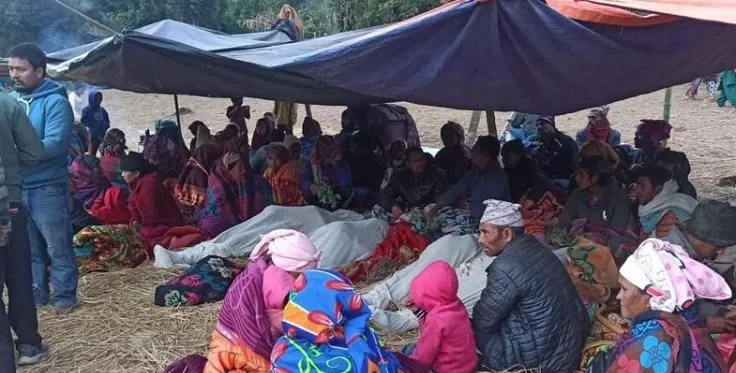KATHMANDU: It has been a month and a half since the devastating earthquake struck Jajarkot, leaving citizens displaced and living under tents.
Despite the urgent need for relocation to temporary housing and the initiation of permanent housing processes, progress in constructing temporary shelters in the earthquake-affected areas of Jajarkot and Rukum West has been alarmingly slow.
Contrary to expectations, political parties that mobilized volunteers for reconstruction and the government’s efforts to establish temporary housing have failed to meet the set targets.
The statistics paint a grim picture of the situation on the ground.
In Jajarkot, where more than 34,000 houses have been damaged, only around 1,000 temporary houses have been constructed.
Similarly, in Rukum West, with over 27,000 damaged houses, the construction of temporary housing remains significantly inadequate.
Following the earthquake, many citizens in Jajarkot and Rukum West, whose homes were damaged, find themselves enduring harsh conditions under tents.
Surprisingly, the political parties that pledged volunteer support for temporary housing construction seem inactive according to the available statistics.
The meager progress in Jajarkot and Rukum West indicates that only a fraction of the required temporary housing has been initiated, despite the promises and initiatives from political parties and local authorities.
Laxman KC, a journalist on the ground in Rukum West since the earthquake, reports a lack of interest from permanent residents in building temporary housing.
Locals express reluctance due to the involvement of various political parties in construction efforts and the government’s ambiguous commitment to the cause.
In the eyes of the affected citizens, the responsibility for constructing temporary housing seems to have been misplaced.
Journalist Laxman KC notes, “The affected citizens did not realize that they should build their own temporary housing on their initiative. They were hoping that someone else would come and build temporary housing.”
The Jajarkot earthquake victims, left in uncertainty and grappling with the challenges of inadequate housing, raise questions about the commitment of authorities and political entities to prioritize the urgent needs of the affected population.
Meanwhile, Prime Minister Pushpa Kamal Dahal has conveyed his skepticism about the party’s ability to construct temporary housing efficiently.
In a recent meeting held at Singha Darbar, he expressed dissatisfaction with the party’s efforts to build 100-200 houses, stating that their demonstration was not successful in reaching the target of 60-65 thousand houses.
To address the slow progress, Prime Minister Dahal announced a change in strategy, indicating that the army and police would take charge of constructing temporary towers.
He emphasized that the government would contribute 50,000 rupees per victim, encouraging those capable of self-construction to take the lead, with support from the police and the army.
Following the earthquake, many citizens in Jajarkot and Rukum West, whose homes were damaged, find themselves enduring harsh conditions under tents.
The growing cold is particularly affecting vulnerable groups, including children, pregnant women, and the elderly, leading to tragic cases of more than 15 people perishing due to the cold.
The slow pace of temporary housing construction raises concerns about the well-being of the citizens enduring the cold in makeshift tents.
The number of daily illnesses, especially among children, pregnant women, and the elderly seeking shelter in tents, continues to rise.
The earthquake has left a significant impact on schools in Jajarkot and Rukum West, with most of them damaged.
Although operational in temporary camps and open-air spaces since early November, the educational process remains sluggish, potentially affecting the annual academic calendar.
Despite the initial pace of relief distribution after the earthquake, the construction of temporary housing faces challenges due to neglect from local government and logistical issues in relief distribution.
While political parties and volunteer squads initially engaged in the construction efforts, a theoretical agreement has been reached to halt relief distribution for 15 days and mobilize locals for temporary housing.
The government’s attempt to streamline aid funds for construction faced hurdles as municipalities struggled to collect beneficiary cost figures in a uniform and timely manner.
Despite allocating funds and entrusting collection to local governments, delays persist as costs pass through various levels of representation.
The current state of affairs calls into question the coordination and efficiency of relief and reconstruction efforts in earthquake-affected areas.
Despite a month of efforts, the government agency tasked with collecting costs for earthquake-affected households is still without concrete statistics.
The lack of clarity and accountability persists as one agency deflects responsibility to another, leaving the crucial question of why involvement in cost collection is essential unanswered.
The sluggish pace of government agencies in this regard has left victims awaiting assistance for temporary housing in a state of distress.
In Rukum West, where over 27,000 houses were damaged by the earthquake, the cost of only 19,934 houses has been collected to date.
Individuals affected by the disaster are currently in the process of receiving the first installment of Rs 25,000 for the construction of temporary housing.
However, it’s crucial to note that this figure is provisional, as the cost collection is still underway in Rukum West.
Despite efforts in Jajarkot, the collection of statistics faces challenges.
The government agency, entangled in a prolonged collection process, has yet to provide finalized statistics, further exacerbating the delay in providing much-needed assistance to those affected by the earthquake.









Comment